#would also be appropriate tags
Text


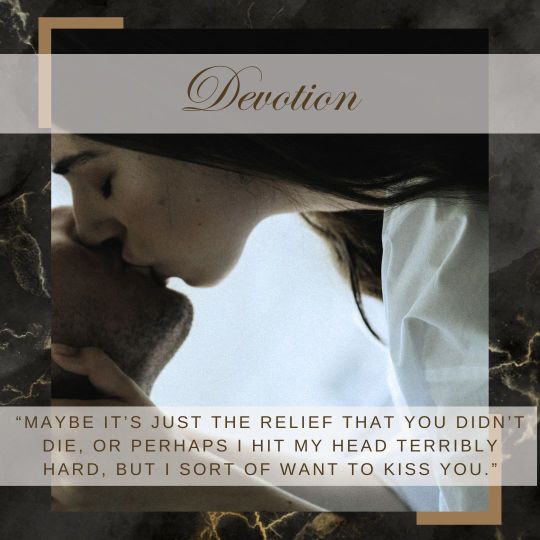

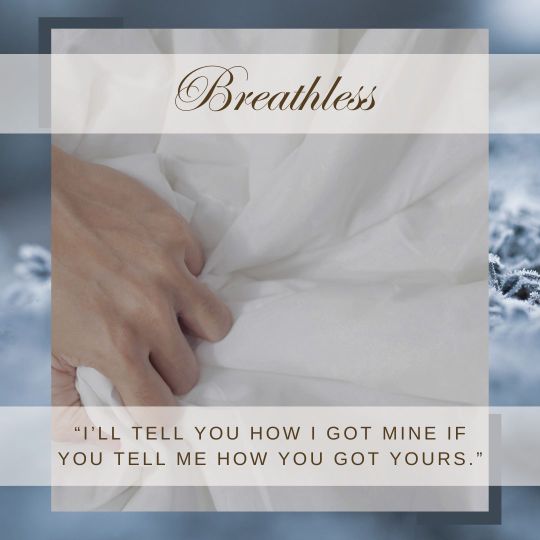
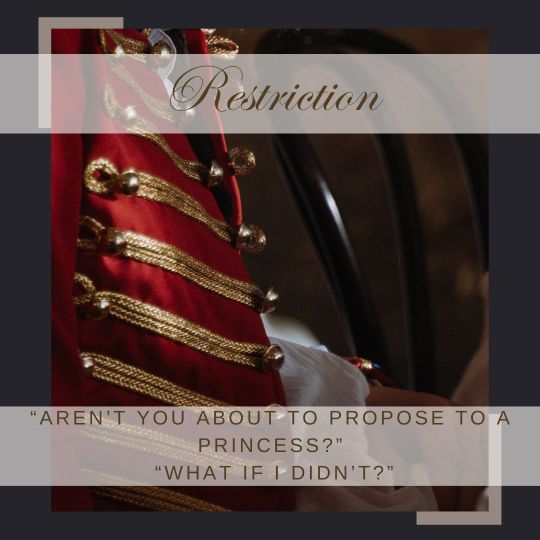
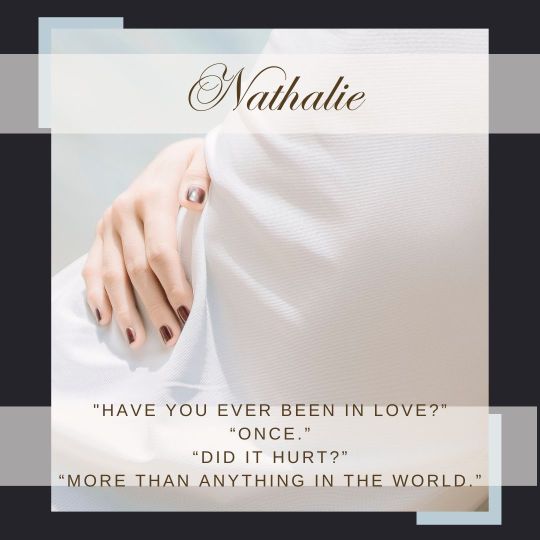
once upon a time, magic was wild
There's a summary on Ao3 about princes choosing their brides before the ball, and how its a Cinderella AU and stuff, but the better summary is:
Marinette is slowly falling for both the thief Chat Noir and the Crown Prince Adrien Agreste; Adrien has loved Ladybug for a year and doesn't know why the seamstress he just met is slowly capturing his heart. While the lovebirds figure their mess out, Felix is busy sorting out the actual plot, uncovering all of King Gabriel's schemes, and trying his utter best to make sure he and Adrien get a happy ending, even if it kills him.
Boulangerella on Ao3 updates approximately every Friday.
#mayhem murder and magic#would also be appropriate tags#miraculous ladybug#ml fic#ml fanfic#miraculous ladybug fanfic#love square#love square fic#felix fathom#felix fathom fic#since this got recced twice (thank you mlbigbang and flightfoot)#i thought it might be nice to post a preview for folks who are intrigued#happy new year#we are also so close to the ending#so so so close#night 3 of the ball is about to begin#boulangerella#ml fairy tale au
7 notes
·
View notes
Note
Demise and ghirahim remind me of rose quartz and pearl from Steven universe

DO IT FOR HIM…..
#I cannot disagree anon#there are a couple.. themes that rose/pearl gets into that I don’t think fit them and I would not like to explore with ghirademi but#the vibes are simply immaculate#I don’t know if I could explain what I mean. my brain is fried. but I hope you all understand#the legend of zelda#skyward sword#ghirahim#ghirademi#demise#crossover#Steven universe#also I’m so sorry to the su tag for putting this bullshit on your feed but hi#I must tag appropriately#ask#anon
1K notes
·
View notes
Text
Soul and Maka tho 👀
I love them a normal amount. I wonder why I ship them. Gee, it couldn't be any number of these little things.
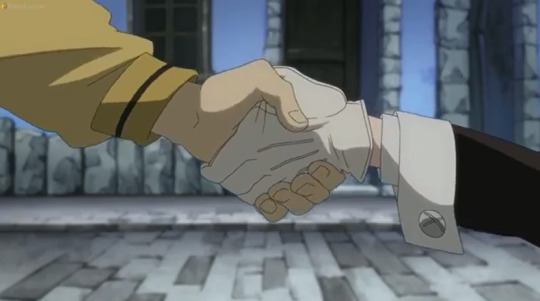
bickers like an old married couple, compares a partner exchange/breakup to infidelity. "Cool men don't cheat."
literally the narrator: "Maka, and her partner and weapon, Soul Eater-"

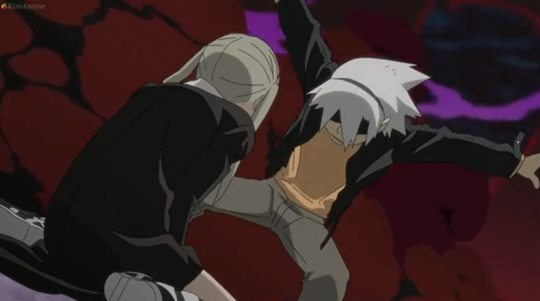
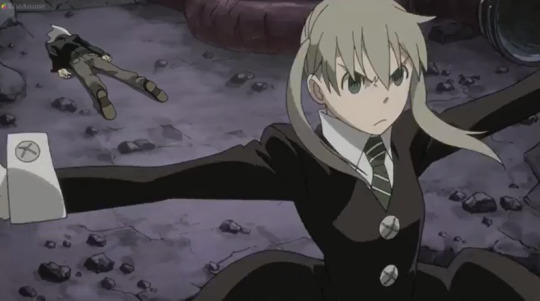
dies for her. dies for her. dies for him.

bonus: breaks her fall
(this post keeps going, i'm putting the rest under a readmore)
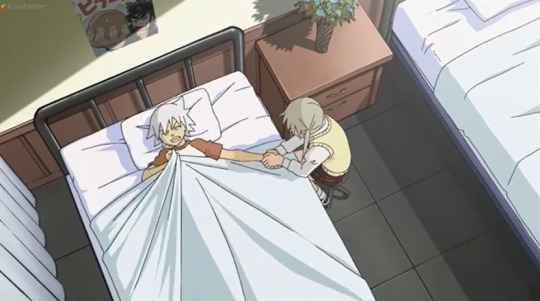
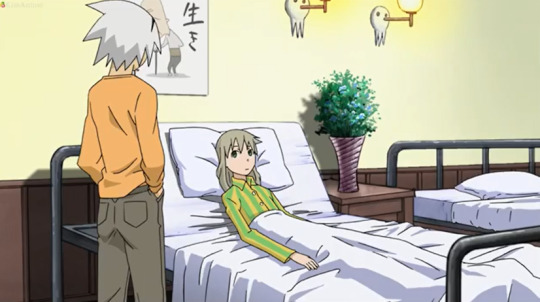
Staying at the bedside while in recovery. The babies.

Couple's Therapy lmao
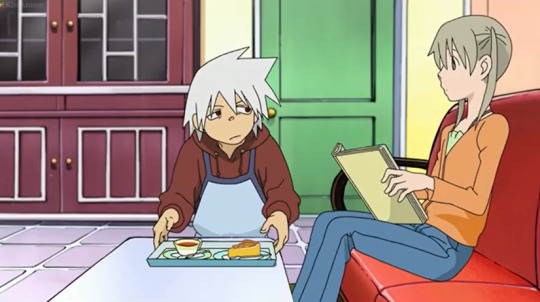
Domestic as all be.

Didn't have to have a special little dance to form a gameplan! Didn't have to dress up for it to enter the black room!

Trusted him to be her lifeline to pull her out of the depths of madness. So he pulled her out of the depths of madness.
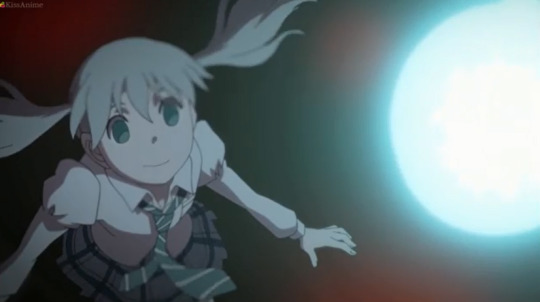
"It's always there for me. This is my Soul Eater's soul!"
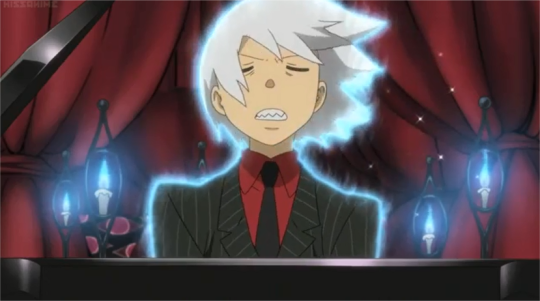


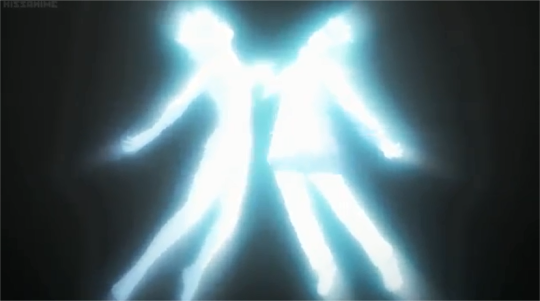
"The sound of his soul. All his emotions, they're flowing from him straight into me. What I'm sensing is…faith, and confidence. This is our foundation. This is our courage!" ok baby stop being so sappy ugh ♥I'm well aware synchronizing is essential to a solid resonance, but they went HARD on this. Soul went hard on this, to stand a chance in this fight. He did this for her.
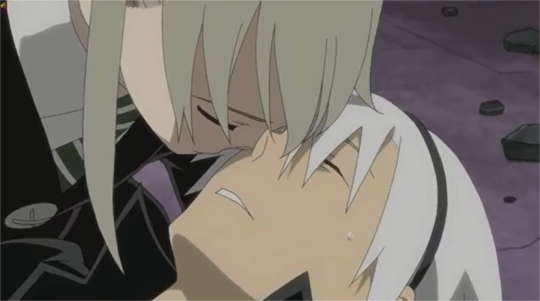

THIS???? Saving him from certain death and/or madness?? She ventured literally DEEP inside his soul to bring him back from the brink.

If Soul's courage is for Maka, of course she'd have the key! PRECIOUS. Key to his heart chest! Yaaasss
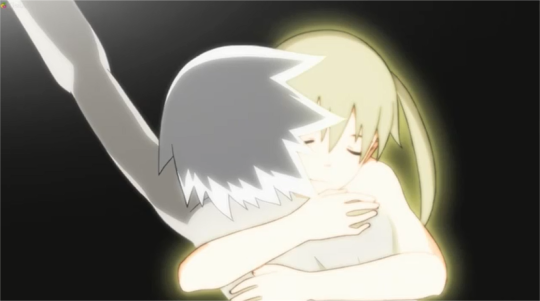
Goes even deeper into his soul, to retrieve that petrified little piece of him he's locked away in the lockbox.
Because none of this is meaningful or intimate as heck, nooooope.
#....BENJI DONT' LOOK AT THIS YOU'RE NOT ALLOWED TO LOOK#SPOILERS#i also love them painfully independently as their own characters too but they are literally soulmates i will bite about it#because i have nothing better to do than cry about my childhood ship lately i guess lmao#i would kill for these babies#ffffffffine bcb i'll tag appropriately#soul eater#soul x maka#soma#maka x soul#maka albarn#soul evans#soul eater evans
527 notes
·
View notes
Text
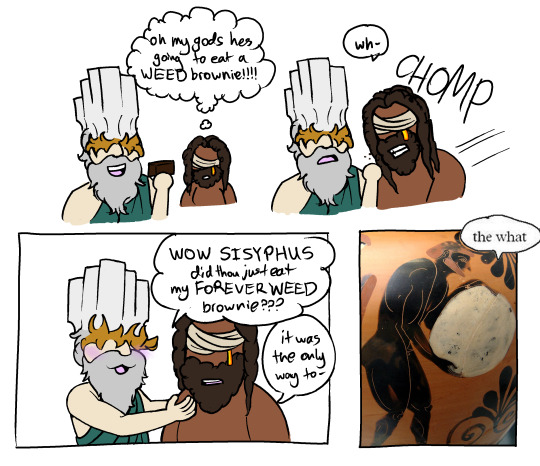
weed brownie that turns you into the ancient greek amphora version of yourself
#Ultrakill#minos#sisyphus#king sisyphus#king minos#id hesitate to tag this as their ship name but it is kind of gay to eat a guys weed brownie.#also it was hard for me to find an appropriate ancient greek depiction of sisyphus i was comfortable using#and im not even fully comfortable with this one!!!#but uh anyways yeah its greek blackfigure pottery and most of the figures skintones are that color on the pottery which makes it feel more#ambiguous than the paintings i found where hes like. white. i know greeks were a majority white population and its only nowadays that#more awareness is brought to the fact not all greeks where white but anywaysssss#the tldr is i was struggling to find an ancient greece depiction of sisyphus that wasnt like. a white guy jumpscare#that would be a little funny though. weed brownie that turns you white. scary
188 notes
·
View notes
Text
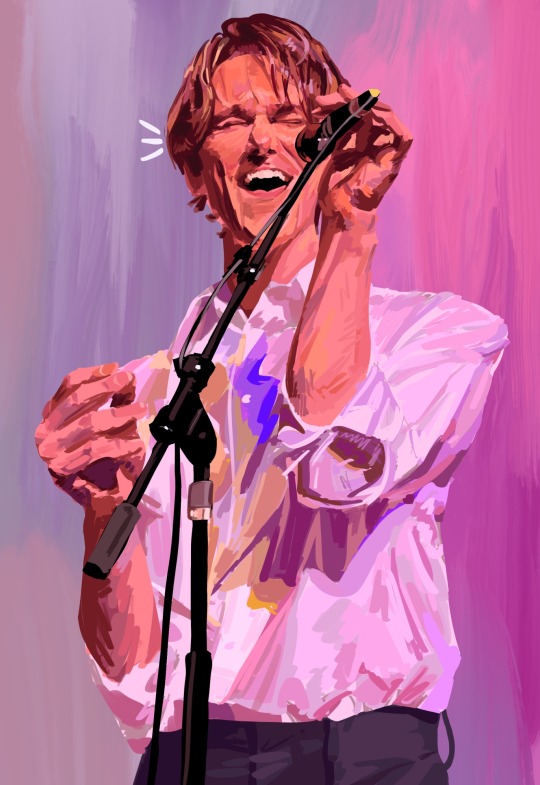
dally!
#sorry that caption feels appropriate#dallon weekes#idkhow#my art#:) <3#wanted to get it done for my birthday but. ehh#gonna post it on ig and tag him. im so fuckign scared#its not. super polished#if you take a look at his shirt its um yea#lets not focus on that rn…….#also a question for the 2 people that will read this — if this drawing were a gloom song which one would it be ??#i want a song to post it with for the. ig post IM SO SCARED
188 notes
·
View notes
Text
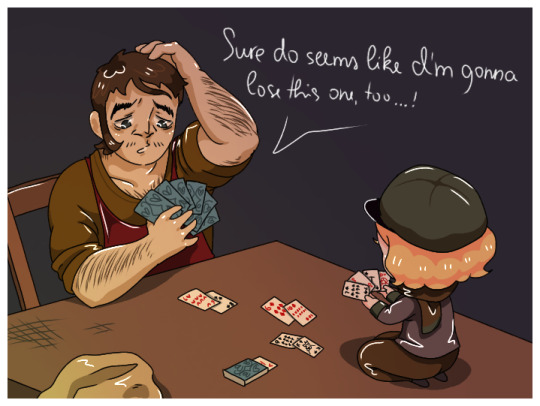

dad duties include going easy on your kids .. intentionally or unintentionally
#south park#pip pirrup#sp pip#sp pip pirrup#south park pip#pip pirrip#joe gargery#would ge also be appropriate to tag here#ok so story time . recently i got a lil ... chess brain damage. brain damage as in i accidentally spent like 7 hours learning how to play c#ess and couldnt fall asleep at night because i was thinking about chess. whatever. and on chess dot com they have this bot that#pretends to be a kind but slow grandpa basically that has v v low elo and goes very easy on you and he has like nice lines and all#and then brain damage number two kicked in
192 notes
·
View notes
Text
SURELY Ally is exaggerating for the bit when they say they talk to their dog like this. I mean this is the kinda behavior that moms nervously usher their kids away from in the supermarket
#like they FOR SURE are making it extra creepy for the bit right?#cuz its really giving hurried 'timmy you know its rude to stare but also would you look at that its time to leave'#im sure the dog loves it tho lmao it is appropriate for the dog#dimension 20#d20#fantasy high junior year#fhjy#ally beardsley#hey girlie#feels like it needs its own tag. its become an entity#edit: i DO have a cat yall. i know the pet talk is real i speak it fluently. but the edge of creep beardsley has added is onbrand and unrea#/lh
60 notes
·
View notes
Note
Oh dearest saintbleeding u r so lovely and if I could look up on ur jmart laughing together and perhaps sitting Too Close in a flirtatious way I would be so happy and fortunate
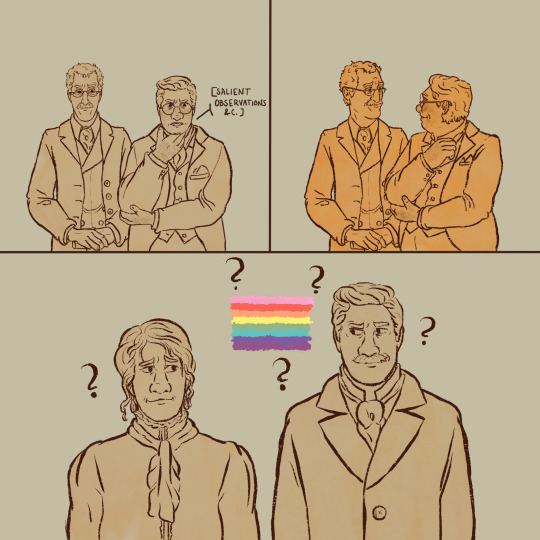
[ID: Three panel comic of Jon, Martin, Melanie, and Tim from TMA. Jon is tall and thin with a moustache, receding hairline, glasses, and walking cane; Martin is shorter and fat with freckles and glasses; Melanie is short and thin with long hair in a chignon; and Tim is tall and stocky with a moustache. In the first panel, Jon and Martin stand staring down at something offscreen with looks of concentration as Martin speaks. A speech bubble says “[salient observations &c.]”. In the second panel, Jon and Martin look at each other, both smiling. In the third panel, Melanie and Tim trade silent, quizzical looks, surrounded by question marks with a Baker pride flag between them. End ID.]
statement of sir joseph spookington esq regarding lgbt happenings in the basement of the magnus institute
#tma#the magnus archives#jonmartin#jmart#jon sims#martin blackwood#melanie king#tim stoker#factual particulars tag#i mean sorta? is this spoilers? i feel like not exactly. also no this would not be period appropriate iconography#but the joke is in 2023 not 1882. love n light#my#saint draws#asks#multipurpose leland tag#leland u were so right for this one my bestie. wow
218 notes
·
View notes
Text
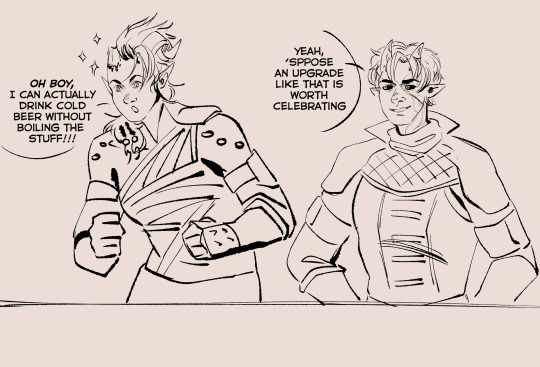


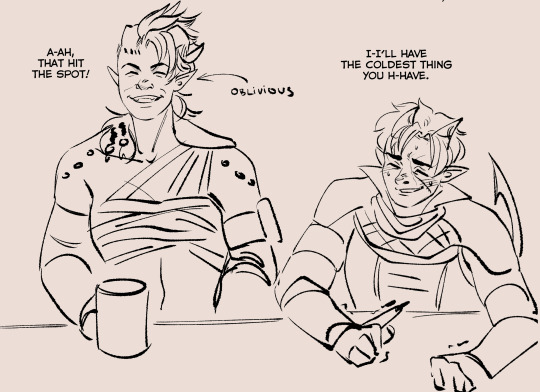
They have just done the second upgrade at the Last Light and haven't had the chance to, ahem, go to camp yet.
The longest evening EVER.
#bg3#baldur's gate 3#karlach#bg3 tav#bg3 karlach#karlach x tav#tav x karlach#tavlach#lesbian tav#is that a tag#art tag#tav posting#Karlach had that one dialogue about frosty pints so I imagine the Inn's bar would be appropriate#also she had 10 years of practice in coping and has other new-old experiences to distract her#Vice however is fighting for her life
104 notes
·
View notes
Text


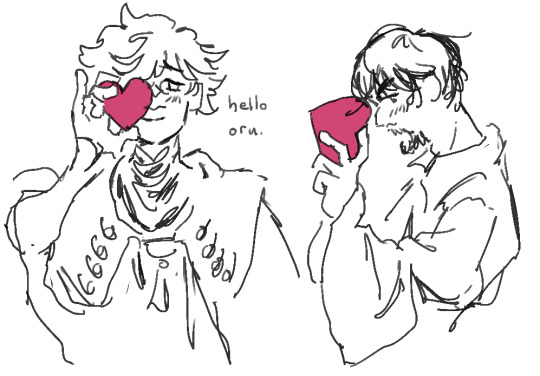
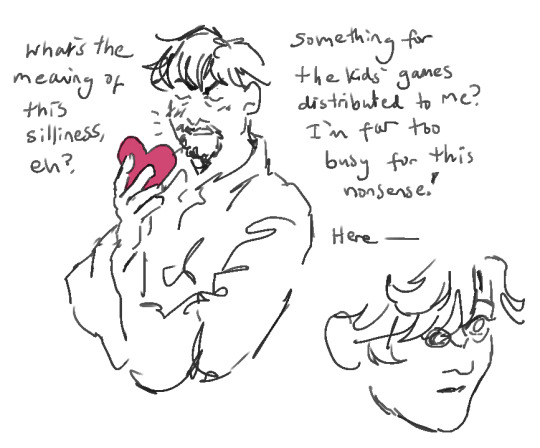
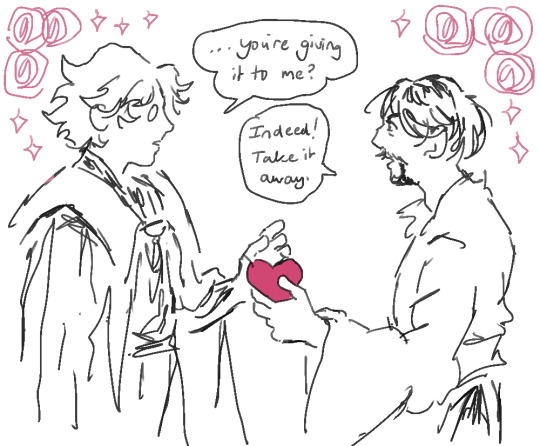
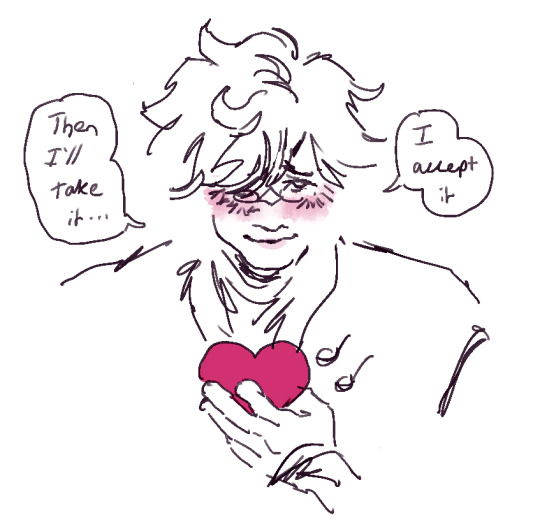


based on valentine's day art shirahama drew once hehe
#witch hat tag#orufrey#if anyone hasn't seen it the 1st and 3rd images are based on that. it was included in the artbook for volume 11#tired of drawing hands in various poses now...#why would qifrey do this though. did you not expect chaos. is this appropriate.#but it's oru who's the “KYAHHH i think theres YOUNG LOVE happening teehee we gotta stay OUTTA THIS ufufuufufu” one#i don't think qifrey has the foggiest that kids could actually have active crushes on each other he just wanted to cut out some cute hearts#for his little lovely kids activities zone. he probably thinks his budding love towards oru as a child was Special. other kids are Normal#well anyway..... i did this now because i want to finish & post an angsty comic tomorrow if possible. Lol#also i drew this thinking that oru is genuinely just trying to give back this weird heart and i was going to have a WAIT- 😳panel#that'd probably be funnier. but no. they're communicating aren't they? our delicate little dance. finding ways#Heavens above i love them
53 notes
·
View notes
Text
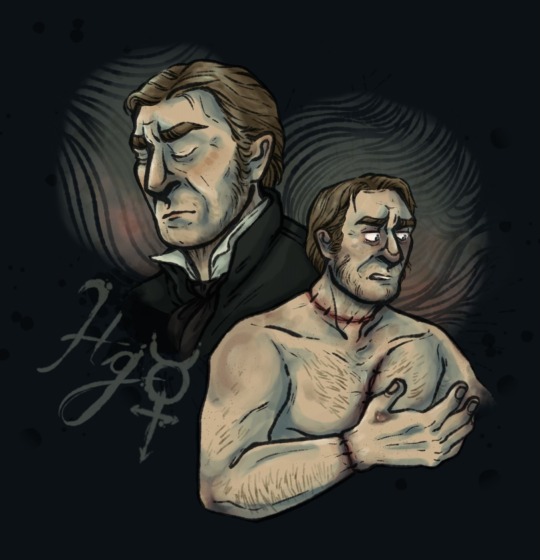
Bodies in my wake /
Noose 'round my neck /
I'm comin' back again /
Better make it quick!
#em draws stuff#frankenstein chronicles is a show you can watch#frankenstein chronicles#john marlott#tagging with the real title as well If anyone is looking in the tag for this show#(I really don't think anyone is but if you are then Hi! sure was a television show there huh!)#best viewed with high screen brightness (I spent three hours coloring and I would like you to be looking)#it has been a while since I returned to this old-favorite topic (stitched-up undead fellows) and I had enough visual inspiration#from the show itself (the blake engravings! the teal lighting in ep6!) to really have fun with the rendering on this one#continuity caveat to the 1.5 people who care - I Know that marlott no longer has the chancre on his hand by the time he's all stitchy#but this show does enough with his unreliable perception of the world around him that I felt that I couldn't leave it out#oh and also that's the elemental symbol for mercury! as it seemed only apt to include it in some way#caption lyrics from american murder song since it seemed only appropriate#(also I listened to all of murder ballads of 1816 while coloring this For The Vibes)#ANYWAY now that I have Drawn Picture I might watch s2 now and find out what happens to this v sad wet man next!
35 notes
·
View notes
Text
Food
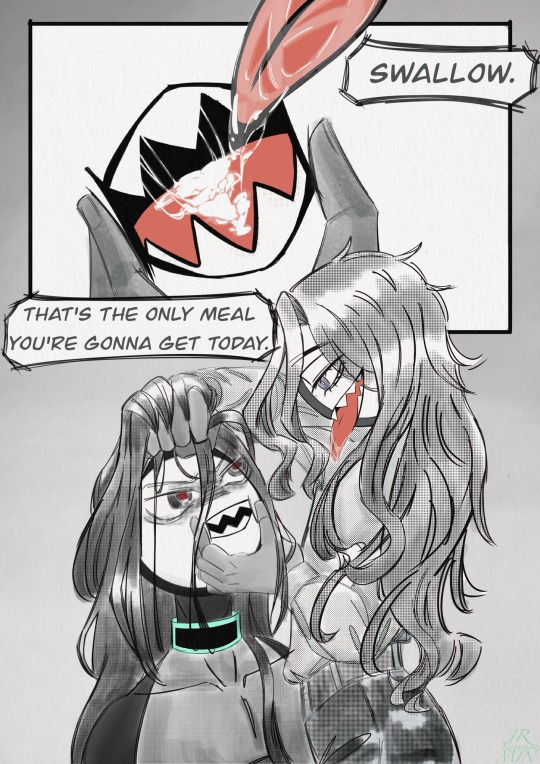
#tired of this bitchis#would you believe me if i say i don't even ship this two?#cause i really don't#but toxic yaoi is toxic yaoi#and i need something to balance my sorta kinda toxic wholesome monster fucking het ship#and this is the thing my brain worms decided to get attached to#the things i do for love#ava ships#viccho#or is it more appropriate to call this darkgray shipping?#also is spitting in someone's mouth nsft?#is a kink#but not that graphic#I'll just tag it just to be safe#suggestive#ava nsft#animation vs animator#animator vs animation#ava tco#ava the chosen one#ava victim#alan becker
38 notes
·
View notes
Text
psst. hey. do you ever worry that you’re writing characters ‘ooc’ in fanfiction? well guess what. you’re not. that’s just your au now.
“they would not say that” yes they would, my au version of this character would totally say that
“ummmm this character’s powers don’t work like that” but they do. in my au
“these characters would never canonically be dating” buddy oh boy i cannot wait to tell you what fanfiction writers have been doing since the advent of their craft!! anything goes in my au!!!
the medium is inherently transformative do whatever you want forever ok ly byye
#fanfic meta#idk if that’s the appropriate tag for this but whatever#And. Look. I do understand wanting to adhere to canon whenever and wherever possible.#Because fanfiction is inherently a love letter to its source#(mmost of the time…)#But when you’re doing something for free I say you’re allowed to do it however the hell you want#so long as you’re having /fun/!#And also#if a prospective reader really wanted something exactly 1:1 with the source material#they would just go reconsume the source material!#Fanfiction (any fan creation really) is experienced under the implicit guise that said fan will have put their own spin on said fiction#in a way i kind of think that’s the whole point#but anyway it’s getting late and these tags are getting longer than the actual post lol#moral of the story is There Are No Rules#and if there Are Rules:#Fuck’em.#thanx for coming to my tedtalk xx
38 notes
·
View notes
Text
Summary: You are an adopted child of Bruce Wayne with trauma responses. Don’t worry. He knows how to give good hugs.
You aren’t entirely sure what brought you here. Your head is empty and all you can feel is uuuugh, and it’s probably going to last for hours. It’s been so long since it started that you can’t even remembered what triggered it. As far as you know, there’s not much you can do about it.
Bruce notices you when you walk in and immediately puts the newspaper aside. “Hey, kid. What’s wrong?”
You open your mouth, but no words come out, and you grimace. You sign at him that you need him to stay put. You feel kind of stupid when you start doing it, but you know it’s necessary and you begin to manhandle the recliner under Bruce until he’s leaning back with his legs up.
He’s stiff, with his hands clenching the armrests a touch too tightly, but he settles down quickly enough. This is how you know he trusts you, however small, with his well being, but today you can’t feel the warm and fuzzies because of the stupid funk you’ve found yourself in.
You hop up onto him and flop down on his chest.
“Y/N?” he says, clearly confused.
The warmth and pressure has already started to do its magic and you find your voice again. “I just want to feel safe for five minutes, okay?”
He hesitates, and you imagine he’s unsure what to say or do. It’s fine, you tell yourself, because this is working. You can speak, after all, so clearly that’s a win.
But then he wraps his arms around you and tangles his fingers in your hair as he presses you deeper into his chest. You feel cocooned in warmth and gentle iron muscles, and you remember you’re not the first kid Bruce has ever adopted. Someone else probably tried to do something similar before, and now Bruce knows what to do for you.
#Batsis!reader#Batson!reader#Batboy!reader#my fic#have some warm and fuzzies#hurt/comfort#Good Dad Bruce Wayne#Bruce would do this for any of his kids#please enjoy#and have a cookie#Bruce Wayne#You are a child of Bruce Wayne with trauma responses.#bruce wayne x reader#bruce wayne x you#what are appropriate tags for this?#idk#Reader#also this has so much tim drake energy omg#triggered
441 notes
·
View notes
Text
I think part of what troubles me about the opinion that Maglor and Maedhros were the “best” people to raise Elrond and Elros is that many (though not all) such interpretations often refer to fanon interpretations as if they were canon. Which there’s nothing wrong with enjoying fanon! But when popular fanon starts being treated as a definitive canon and subsequently starts being used as a lens for textual interpretation and engagement (and in some extreme cases, an excuse for bashing other characters), that’s when it gets a little eyebrow-raising.
So in this post, I’m going to examine some of the more common fanon beliefs and headcanons around Maglor and Maedhros as parental figures/guardians to Elros and Elrond. The point is not to debunk them and say that you cannot interpret the texts this way or enjoy them as a fan reading. Indeed, if there was no textual or analytical basis for these headcanons altogether, they would not exist. Neither is this meant to bash anyone. Rather, I’d like to show that many of the assumptions we hold are nowhere near as solid or definitive as they sometimes seem to be, and that there is in fact room for a plurality of different headcanons and readings to coexist without elevating one over the other.
1. Maedhros and Maglor were both involved in Elros and Elrond’s upbringing.
As the wealth of Kidnap Fam content demonstrates, this is a very common headcanon. However, let’s look at what the Silmarillion says. Bolding is mine for emphasis.
For Maglor took pity upon Elros and Elrond, and he cherished them, and love grew after between them, as little might be thought; but Maglor’s heart was sick and weary with the burden of the dreadful oath. (”Of the Voyage of Eärendil”)
Nowhere is Maedhros mentioned. He is mentioned in the version of the story included in The Fall of Gondolin, where the passage instead reads:
For Maidros took pity on Elrond, and he cherished him, and love grew after between them, as little might be thought; but Maidros’ heart was sick and weary with the burden of the dreadful oath. (”The Conclusion of the Quenta Nolodrinwa”)
Christopher Tolkien’s commentary directly interjects after this to observe that the passage was rewritten to be the version in the published Silmarillion, which is an interesting distinction to make when the entire version of the story it comes from is very different from the one in the Silmarillion; it is also worth noting that apart from changing which Son of Fëanor it was, Tolkien kept this passage nearly verbatim in the Silmarillion.
Maedhros is also mentioned in the preceding chapter, in Tolkien’s sketch of the mythology, with the line:
Their [Eärendel and Elwing] son Elrond who is part mortal and part elven, a child, was saved however by Maidros. (”The Conclusion of the Sketch of the Mythology”)
So yes, there was once a version of the story in which Maedhros was the one who spared Elrond (Elros did not yet exist, at least not as Elrond’s brother, at this point in Tolkien’s thinking). This version of the story differs quite significantly from the published version in the Silmarillion; as Christopher Tolkien comments, the Silmarils were of much less significance and had differing fates (Beren and Lúthien’s Silmaril was lost in the Sea after Elwing threw it in, Maglor threw another into a fiery pit, and the third was taken from Morgoth’s crown and launched into the outer darkness by Eärendil). Also notably, Eärendil does not intercede on behalf of Middle-earth before the Valar.
Of course, being a Tolkien fan pretty much entails picking and choosing which bits of the Legendarium you like. If you want to take Tolkien’s original thinking that it was Maedhros rather than Maglor who cherished Elrond and Elros, and mix that with the more common version of events in the Silmarillion, go wild. You can say that the narrator is unreliable, that it makes logical sense for Maedhros to be involved, or that it’s simply more fun to imagine domestic shenanigans with the last two Sons of Fëanor. But there’s a difference between blending versions of the story as your own personal headcanon, and asserting that headcanon as the one true fanon.
It is also interesting to observe that at no point are both brothers mentioned in relation to Elrond and Elros; it is either Maglor or Maedhros. The version in The Fall of Gondolin has Maglor sitting by the Sea and singing in regret after the Third Kinslaying while Maidros saves Elrond; in the Silmarillion, it is only Maglor who takes pity on Elrond and Elros.
2. No one else cared about Elros and Elrond; only Maedhros and Maglor did.
Very explicitly in The Silmarillion, “Great was the sorrow of Eärendil and Elwing for the ruin of the havens of Sirion, and the captivity of their sons, and they feared that they would be slain...” (”Of the Voyage of Eärendil”). But we also read:
Too late the ships of Círdan and Gil-galad the High King came hasting to the aid of the Elves of Sirion; and Elwing was gone, and her sons. Then such few of that people as did not perish in the assault joined themselves to Gil-galad, and went with him to Balar; and they told that Elros and Elrond were taken captive, but Elwing with the Silmaril upon her breast had cast herself into the sea. (”Of the Voyage of Eärendil”)
Again, bolding is mine for emphasis.
What we see in the Silm version of the story is that 1) when Sirion was attacked, Círdan and Gil-galad raced to help but were too late, 2) a very large percentage of the population of Sirion died in the Kinslaying, and 3) those who survived reported that Elros and Elrond had been taken captive. That’s it.
True, there is no mention of any rescue attempts or negotiations, but there also isn’t mention of anything else because at this point, the narrative returns to Eärendil. Which makes sense, because the voyage of Eärendil is the whole entire point of the chapter, and arguably the climax of the version of the narrative that’s in The Silmarillion. It’s not “Of the Captivity of Elros and Elrond,” or “Of the Third Kinslaying,” the main focal point of the story is Eärendil sailing to Aman and pleading for all the people of Middle-earth.
There’s also another version of this story in The Fall of Gondolin, where we read:
...but the folk of Sirion perished or fled away, or departed of need to join the people of Maidros, who claimed now the lordship of all the Elves of the Hither Lands. (”The Conclusion of the Quenta Noldorwa”)
In this version, the survivors do not go to Gil-Galad, but either flee or join Maedhros who now claims lordship of all the Elves. If you go by this story, then there really is very little possibility of a rescue, since 1) Maedhros is now the most powerful lord among the Elves and claims authority over all who are left, where would they even go if they got away, and 2) it would therefore be a betrayal to stand against or attack one’s lord. It also opens up the possibility that Elrond (this is the version without Elros) had other survivors of Sirion around him while he was a captive, and was therefore not alone.
What all this means though is that we can headcanon whatever we like regarding what happens in Beleriand during this time, but we really don’t have enough information to definitively say what did or did not happen. And what information we do have in The Silmarillion at least suggests that Círdan and Gil-galad cared about the people of Sirion and tried to help them, and also that the people of Sirion were not in great shape to be mounting any sort of attack on Maedhros and Maglor.
Also, just because someone who survives a horrifically traumatic mass murder which killed nearly everyone they knew does not immediately go out and fight for the well-being of other survivors, it does not therefore mean that they don’t care about them or that they care less than the perpetrators.
3. Maglor raised Elros and Elrond to adulthood.
This is another one of those instances where the absence of evidence does not make a positive. We don’t actually know for certain how long Elros and Elrond were with Maglor. In the early letter where Elros and Elrond are found in a cave, it is implied there that they were left there by the sons of Fëanor after they were taken captive, and later found by other, unspecified Elves. In another version, in The Fall of Gondolin, it reads:
Yet not all would forsake the Outer Lands where they had long suffered and long dwelt; and some lingered many an Age in the West and North, and especially in the western isles. And among these were Maglor as has been told; and with him Elrond Half-elven, who after went among mortal Men again... (”The Conclusion of the Quenta Nolodrinwa”)
This is also the version of the story where Elros does not exist and it is “from [Elrond] alone the blood of the Firstborn and the seed divine of Valinor have come among Mankind” (”The Conclusion of the Quenta Nolodrinwa”).
Then there’s also this which Elrond says in Fellowship of the Ring:
Thereupon Elrond paused a while and sighed. ‘I remember well the splendour of their banners,’ he said. ‘It recalled to me the glory of the Elder Days and the hosts of Beleriand, so many great princes and captains were assembled. And yet not so many, nor so fair, as when Thangorodrim was broken, and the Elves deemed that evil was ended for ever, and it was not so.’ (”The Council of Elrond”)
What we see is that Elrond, at least, witnessed the end of the War of Wrath, including the breaking of Thangorodrim. Then there is this passage from the Silmarillion:
Of the march of the host of the Valar to the north of Middle-earth little is said in any tale; for among them went none of those Elves who had dwelt and suffered in the Hither Lands, and who made the histories of those days that still are known; and tidings of these things they only learned long afterwards from their kinsfolk in Aman. (”Of the Voyage of Eärendil”)
In most versions of the story, the Elves who lived in Beleriand took part in the major conflicts of the War of Wrath. Men do -“And such few as were left of the three houses of the Elf-friends, Fathers of Men, fought upon the part of the Valar...” (”Of the Voyage of Eärendil”)- but very clearly no Elves. So Maedhros and Maglor did not participate in or witness the main battles of the War of Wrath, but according to Lord of the Rings (which I would argue holds the “most canonical” status over every other text in the Legendarium) Elrond was there to remember firsthand, if not take part in, major events in the War, suggesting that they were no longer together at that point (which does not preclude Elrond returning to them afterwards, though it would be a very tight timetable with the Fourth Kinslaying).
Returning to the original point, Elros and Elrond could very well have stayed with Maglor until they were grown, even up to and beyond the Choice. They could equally have left Maglor and Maedhros at any point, or Maglor could have left them with their other kin. Tolkien changed his mind a lot about the details of the end of the First Age! There are a good number of different canons, to say nothing of opportunities for different headcanons.
4. Elros and Elrond turned out to be great people which is all down to Maglor (and Maedhros)’s childrearing (and therefore they were the best possible people to raise them).
Hear the sound of that old familiar bell ringing again? Absence of evidence one way does not mean that another way is automatically true! We actually don’t have any information at all about how Maglor brought them up, only that emotionally, there was some element of mutual love in the relationship. We don’t know for certain how long Elros and Elrond were with Maglor (a few months? a few years? all the way to adulthood?) and we don’t know how or what sort of things Maglor taught them or to what degree they absorbed those lessons.
Yes, Elros and Elrond became great people. But there is simply too great a gap of information to correlate (either positively or negatively) all their future deeds and character to Maglor (and/or Maedhros)’s upbringing. Not to mention, people are not only the products of the people who raised them. So many people influence us on a daily basis, from friends to coworkers to enemies. While Maglor (and Maedhros) doubtless did have an influence on how E&E grew up and who they became, it seems a little reductive to credit them as the defining factor in Elros and Elrond’s morality or greatness, when both of them (E&E) lived very long lives for their respective fates and met many people and experienced many things.
Narrative Analysis: What’s this about themes?
Textual analysis aside, there’s one other factor which I think is missing in a lot of these discussions, which is genre. The Legendarium is full of tragedy. Good people make bad decisions, or suffer (often unjustly) the consequences of another person’s decisions. People are placed in terrible situations where there is no “good” or “right” decision, where anything they choose has tragic consequences. Sometimes people make decisions believing that it is justified or for good, only to discover that it was very much the opposite. Sometimes people know that what they are choosing will hurt them or others, but for one or many reasons, they do it anyways.
The point being that many of the characters Tolkien wrote are purposefully nuanced and tragic. Yes, there’s a Dark Lord and some very terrifying spiders who are unequivocally evil, but otherwise, nearly every character is some shade of grey. Characters make decisions with both positive and negative consequences; they exist simultaneously as figures of both heroism and antagonism. In short, they’re complex! That’s why they’re so compelling and enjoyable!
So why set up a dichotomy of “So and so is better than so and so”? Rather than pitting the sons of Fëanor as “the best” in comparison to other characters, why not embrace the complexity of the narrative?
In order to save the entire world, Eärendil and Elwing had to leave their young children forever. They could have decided to go back and try to rescue their children, and in doing so they would have also doomed the entire world. Whatever they chose, someone would suffer for it. It’s a question that we see explored a lot in fiction but which most of us will never have to confront ourselves: if you were in a position where you had to choose between your loved ones and the fate of the world, which would you choose?
Maglor, a character who has acted almost exclusively as a follower throughout most of the narrative, for once realized the consequences of his actions and, crucially, took active responsibility by caring for and cherishing the children he kidnapped. It does not absolve him of responsibility for the Kinslayings because children are not tools to redeem the adult figures in their lives, and in any case, it is a fruitless pursuit to attempt to moralize fictional characters existing in a very particular setting and narrative. However, it is a significant moment in his character arc, especially as we afterwards see him begin to openly contradict and disagree with Maedhros, multiple times within the same chapter after being a relatively silent follower throughout the narrative. Which makes it all the more tragic later when he slays the guards with Maedhros and steals the Silmarils because we know now that he did not want to, that he might have chosen differently, but ultimately he did not.
Maedhros knew that the kinslayings were wrong and repented of them, and did not attack Sirion for many years. However, he still did it in the end. *mumbles in V for Vendetta “I have not come for what you hoped to do, I have come for what you did do”* He did not kill Elrond and Elros, and in some early versions of the story, was indeed the one to save them rather than Maglor. He also continued to kill in the name of the Oath. Rather than isolating any one of these things as proof of goodness or badness, all of them work together as part of his tragic figure - a prince, once great, with good intentions, who has fallen to such a point in his life that all he can see around him anymore is death and despair.
(On a side note, Maedhros-Hamlet AU when)
Elros and Elrond were young children who survived a horrifically traumatic event. They were able to develop some sort of loving relationship with Maglor (or Maedhros), and as adults, they took pride in Eärendil and Elwing as their parents. Rather than pitting Maglor against Eärendil and Elwing, is it not more important that amidst the apocalyptic horrors of late First Age Beleriand, Elros and Elrond had adult figures in their lives who loved them and cherished them, both before and after the Kinslaying? Love is not the only important thing in the world, of course, and it is not meant to justify any of the actions taken by the aforementioned adults. But. Amidst the tragedy of the broken world they lived in, they were loved.
Summary: Headcanons are great and can co-exist with each other
Not to belabour the point, but there is really so much we do not know about the end of the First Age. Tolkien changed and developed his thoughts on his world throughout his life, and even with what he did set down in writing, there are plenty of gaps where we can only guess. That’s part of what makes the Legendarium so fun to engage with as readers!
With all that in mind, there’s nothing wrong with having a preferred version of the story or a favourite set of headcanons, so long as we acknowledge that they are not the only way to engage with the text. Furthermore, fiction and fan engagement is not meant to be about the moral high ground. Especially with the complex characters and world that Tolkien created, you don’t need to put down other characters or narratives in order to justify your preferred reading. It’s First Age Beleriand! To modify a parlance from Reddit, Everyone Sucks At Least a Little Bit Here. Characters can have good intentions with tragic consequences, make bad decisions but have some good come out of it nonetheless, or do things which have both positive and negative impacts.
Eärendil and Elwing do not need to be horrible or unfit parents in order for Maglor and/or Maedhros to genuinely pity and cherish Elros and Elrond. Those are separate relationships with no correlation. And none of them need to be perfect parental figures in order for Elros and Elrond to have real loving relationships with all of them. It’s not a competition for who can “best” raise Elros and Elrond or who loves them “the most.” You can love Maglor and Maedhros as good parents! There’s just no need to go putting anyone else down, or to treat it as the one definitive interpretation of the characters and the story.
#lotr#silmarillion#i cannot emphasize enough that this is not a personal criticism of anyone or anything#but rather meant to show how the legendarium allows for a plurality of readings and engagement#and that we don't need to Discourse over which character is better or what reading is superior#we can interpret and engage with the legendarium in different ways without putting anyone or anything else down#also; if you really dislike a character and would just like to vent about them; please tag it appropriately with an anti- tag!#it's so disheartening to go into the main tag and see an untagged post bashing a character you like
179 notes
·
View notes
Note
Not a question but let me tell you:
It doesn't matter if someone mixed Jafar and Jamil already, you can still do it yourself as well! After all, the idea might be on the internet already but it hasn't been done by *you* :)
I fully support it
(In reference to my tags on this post)
Well, since I’ve been enabled, enjoy y’all (I'm so sorry):
Jafar-style:

Which - not the worst? I mean would look better if I actually knew what I was doing but.
I found this art of Jafar by MarioOscarGabriele on DeviantArt which very conveniently helped me line up Jafar’s facial hair with Jamil’s face.
And of course I also had to attempt a big bushy beard, and well, the sultan is right there:

...yeah that definitely just looks like a costume beard
I ran out of patience when trying to freehand things but this pencil mustache actually doesn't look as bad as I thought?

Alas, I couldn't find any sort of a braided dwarf beard that I could've slapped on his face, otherwise I totally would've gone for that, too.
#twisted wonderland#jamil viper#chatting with folks#b0njourbeach#my apologies if you wanted something less cursed#this sure would be much easier if I actually knew how to draw but with my skillset photo manips is what you get#been a while since I've fumbled my way through gimp for some good old nonsense#is this still even my usual original post tag?#ner talks#since this is not really much talking but more pics#(yes I may well be overthinking my organisational methods once again)#also not sure why exactly glomas jamil in particular seemed the appropriate target but he just did
14 notes
·
View notes